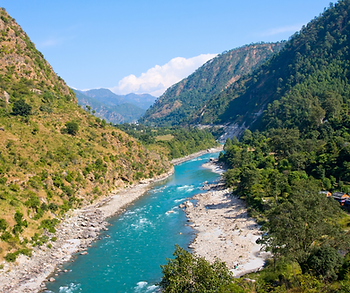Water Deities
Water deities are powerful spiritual beings associated with various bodies of water and the energies they represent. These deities have been revered in different mythologies around the world, each with unique attributes, symbols, and stories.
For example, Poseidon from Greek mythology is the god of the sea, earthquakes, and horses. His symbols include the trident, dolphins, and horses. Known for his temperamental nature, Poseidon plays a significant role in many Greek myths, including the creation of horses and his battles with other gods. To honor Poseidon in your water magick practices, you can make offerings of sea salt, seashells, and blue candles. Performing rituals near the sea or using seawater can also invoke Poseidon's protection and strength.
Yemaya, from Yoruba mythology, is the mother of all Orishas and the goddess of the ocean, fertility, and motherhood. Her symbols include seashells, fish, and the color blue. Revered as a nurturing mother who protects her children and provides them with abundance, Yemaya can be honored with offerings of fresh flowers, watermelon, and white candles. Performing rituals near the ocean or with ocean water and creating a small altar with her symbols allows practitioners to offer prayers for protection and guidance.
In Aztec mythology, Tlaloc is the god of rain, fertility, and water, symbolized by frogs, water lilies, and the color blue-green. Tlaloc was believed to control the rains and provide agricultural fertility, essential for the Aztec civilization’s survival. To honor Tlaloc, one can make offerings of corn, beans, and jade stones. Collecting rainwater for use in rituals and invoking Tlaloc’s blessings for growth and fertility in life are effective ways to connect with this deity.
Sacred Water Sites

Around the world, many rivers, lakes, and oceans are considered sacred and hold deep spiritual significance. The Ganges River in India, for instance, is considered the holiest river in Hinduism, believed to purify sins and aid in achieving moksha (liberation). It is said that the Ganges flows from the feet of Lord Vishnu and through the locks of Lord Shiva’s hair, carrying divine blessings. When visiting the Ganges, it is important to approach with reverence, participate in local rituals like the Ganga Aarti, and avoid polluting the river.
Lake Titicaca, situated between Peru and Bolivia, is sacred to the Inca and other Andean cultures, believed to be the birthplace of the sun and the Inca civilization. According to legend, the first Inca king, Manco Capac, and his sister-wife, Mama Ocllo, emerged from the lake. When visiting Lake Titicaca, engaging in local traditions and ceremonies and respecting the natural environment and the cultural heritage of the local communities is crucial.

The Great Barrier Reef in Australia holds cultural and spiritual importance for the Aboriginal and Torres Strait Islander peoples, connected to their Dreamtime stories. It is believed that the reef was created by ancestral beings and is a living part of their spiritual heritage. To connect with the reef respectfully, one should engage with indigenous guides to learn about its cultural significance and practice responsible tourism to protect the reef’s ecosystem.
Creating and Maintaining a Water Altar
Creating a water-themed altar serves as a focal point for your water magick practices, helping you to connect with the element of water and its associated deities. A water altar provides a dedicated space for rituals and meditation, enhancing your connection to water deities and bringing emotional balance and healing into your life. Items to include on the altar are a bowl of fresh or moon-charged water, seashells, crystals such as aquamarine and moonstone, blue or white candles to represent the water element, pictures or statues of deities like Poseidon, Yemaya, or Tlaloc, and natural elements like sand, seaweed, or driftwood.

To maintain and use your altar effectively, cleanse it regularly with saltwater or incense to maintain its purity. Spend a few minutes each day meditating at your altar, offering prayers, or performing small rituals. Update the altar to reflect seasonal changes and your evolving intentions.
By connecting with water deities, visiting sacred bodies of water, and creating a dedicated water altar, you can deepen your practice of water magick and invite the transformative power of this element into your life.








Comments